Social media contests are a great way to engage followers, find new customers and collect useful marketing data. But with the finance sector governed by regulations, you must be extremely careful. Since one of your goals is to entertain customers and develop a strong B2C bond, the last thing you want to do is to get in trouble. So here’s a rundown of best practices to follow when running contests in the finance space.
But first, a recap of the rules.
Financial Contests: The Rules You Need to Know
Running a contest is a great idea. But there needs to be a plan and strategy involved. If you plan to run a trading contest then you will need to involve many departments. Your risk team, dealing room, compliance, legal and marketing will all need to be on the same page. You will need constant monitoring, a landing page, terms and conditions and regular social media updates. If you want to run a social media contest then here’s what the social platforms and regulators have to say:
Facebook Contests
- Facebook states, ‘Pages, Groups, and Events must not promote products, services, schemes or offers using deceptive or misleading business practices, including those intended to scam people out of money or personal information.’
This is very much in-line with the FCA’s handbook which states: ‘When a firm communicates information to a customer, it must take reasonable steps to do so in a way that is fair, clear and not misleading.’ So don’t make the prize sound better than it is just to get more likes, shares and participants as this is against the rules. Also, make sure the terms and conditions are clear to see and are not purposefully hidden.
ASIC is on the same page. Their cross-team advertising working group looks for promotions (including contest content) that are misleading or deceptive. They also keep an eye out for promotions that identify products to be unsuitable, inappropriate or exploitative of people in a fragile post-pandemic economy.
What can you do?
When it comes to running your very own branded contest, don’t ignore the rules. Make sure you highlight the various risks and limitations of your offering in both the caption and any graphics used. Statements such as ‘all investments involve risk’ will help you to stay out of hot water. Check out this example of a compliant competition post by trading brand Robinhood. The wording is enticing, but there’s no messing about with regards to the risks involved.


- Facebook also states that ‘Pages, Groups, and Events must not promote online gambling, or gaming where anything of monetary value (including digital currencies) is required to play and anything of monetary value forms part of the prize, without our prior written permission. Common types of gambling or gaming activities which may require permission include betting, lotteries, raffles, casino, fantasy sports, bingo, poker, skill game tournaments and sweepstakes.’
The Advertising Standards Agency has similar rules stating, ‘Promoters should take legal advice before embarking on promotions with prizes, including competitions, prize draws, instant-win offers and premium promotions, to ensure that the mechanisms involved do not make them unlawful lotteries.’ A prize promotion might be considered an illegal lottery if participants are required to pay to enter or to pay for goods at a price that reflects the opportunity to participate.
What can you do?
Know that prize competitions can go ahead as long as no money is demanded from the participants. Take a look at this example from Barclays Bank UK. The prize is exciting and designed to draw followers to the Barclays app. It also rewards a loyal community. According to ASA, however, there are several things to remember when running such a contest.
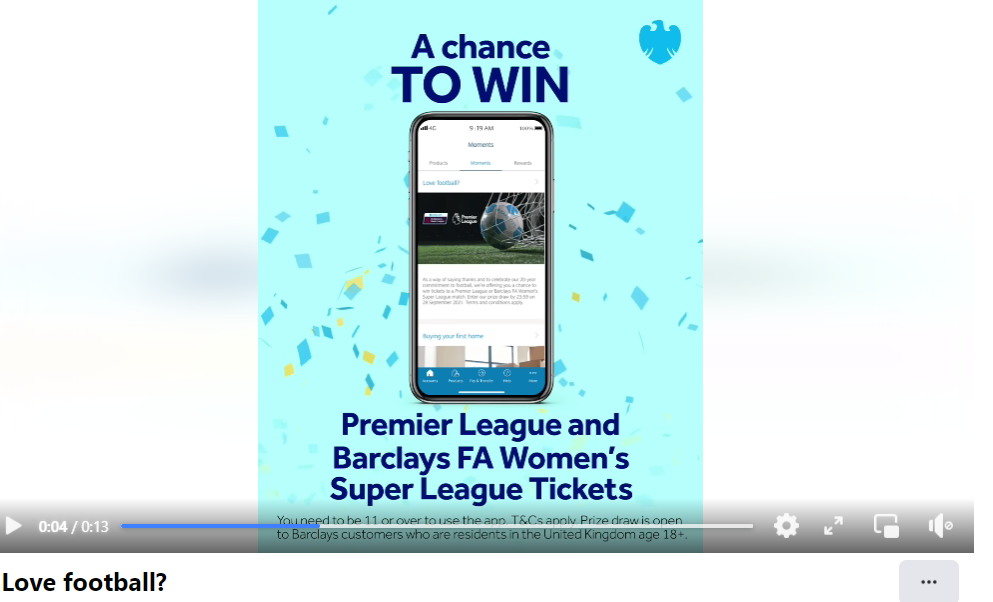
- Promoters are responsible for the administration of their prize draws and must ensure that promotions are conducted under proper supervision, and that they have adequate resources in place to administer the promotion as described (8.15). Promoters must also plan to allow adequate time for each stage of the promotion, including collecting entries, selecting winners, and announcing results (8.15).
- Where entry into a prize draw is based on participants carrying out multiple actions promoters must make sure they can accurately track all entrants and include all participants who meet the entry criteria when selecting the winner. The ASA has considered complaints about multiple prize draws advertised online, which required participants to carry out multiple actions such as liking an Instagram post, tagging a friend, and subscribing to an influencer’s social media channels. Because promoters were unable to demonstrate how they had planned to administer these promotions or accurately collate all entries, including bonus entries, they were upheld by the ASA. Remember that “likes” are not an accurate way of participating due to the easy availability of bots. Your contest rules should forbid bot entries and also require genuine profiles to participate.
It’s also important to note that, prize competitions on social platform do not need a Gambling Act licence. But a prize competition should encourage entrants to exercise skill or judgement or to display knowledge such that it can be expected to prevent a ‘significant proportion’ of people from participating or from receiving a prize. A great example of this can be seen via this Revolut collaboration on Twitter which rewarded those who told the greatest stories about their start-up relationship with Bitcoin.
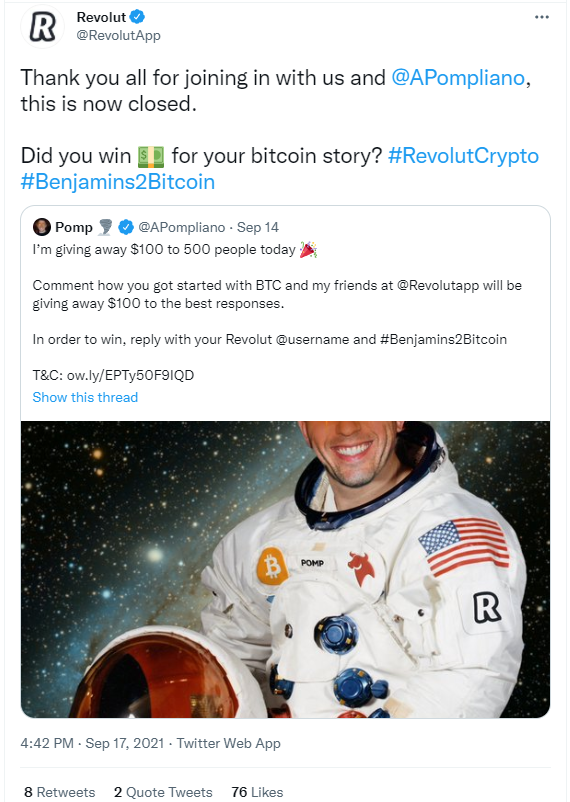
So, when thinking about what kind of contest you want to run, don’t be afraid to make people work in order to benefit from a prize. Come up with a brand-related idea and even partner with a suitable influencer to improve brand awareness and outreach.
Twitter Contests
Here are a few additional contest rules from Twitter:
- Twitter is very clear that marketers should not encourage duplicate content and that those who do could be filtered out of the Twitter search. So avoid setting conditions such as ‘Whoever Retweets this the most wins’ and make it clear that multiple entries in a single day will not be accepted.
- As with all social media and advertising channels, Twitter prioritises and enforces GDPR rules and regulations. This means you may not publish or post other people’s private information without their express authorisation and permission. So make sure you follow GDPR rules carefully and if you’re unsure about anything, don’t hesitate to pass things by the compliance team.
- Twitter also has strong rules governing the finance space and what can be promoted. If you plan to boost your contest tweet then be sure to read them first to avoid a ban!
GDPR rules on social are aligned with those from the FCA, CySEC and other governing bodies of the industry which explain how, ‘GDPR requires firms to provide information to clients clearly setting out ‘privacy information’, which includes the purposes for which they are collecting or processing client data, and individuals’ rights when their data is processed.’
What can you do?
A simple way to be GDPR-compliant is to post a link to your contest terms. This should explain that anyone taking a certain action will automatically give their consent for their details to be used. Make sure the link is clearly visible and not broken.
Instagram Contests
- Promotional material including contests on Instagram must include a complete release of Instagram by each entrant or participant. Marketers must also declare that the promotion is in no way sponsored, endorsed or administered by, or associated with, Instagram.
- Marketers who use Instagram to communicate or administer a promotion (example: a contest or sweepstakes), are responsible for the lawful operation of that promotion, including following all official rules.
- Focus on the wording of your caption to ensure you cover the Instagram contest requirements. Hit up your compliance team for a final check before posting.
Contest Best Practices for Finance Brands
We’ve touched on a few already. But here are several other best practices to remember when running a branded contest.
Provide Crystal Clear Instructions
As you’re more than aware, social media users are impatient. They want all the good stuff, and they want it now. So make your competition as easy to follow as possible. You can do this by providing numbered or bulleted step-by-step instruction lists. Make sure that the call to action also benefits the purpose of your contest. If you’re trying to improve brand awareness, for instance, encouraging people to ‘tag a friend’ as part of the entry criteria is a good idea. You can then use analytics to track how well this incentive worked.
Check out how M4 Markets encouraged users to tag a friend. Also note the clear use of dates. This creates a sense of FOMO and encourages people to act promptly. Hashtags are also used correctly. Branded hashtags are designed to boost exposure and make the competition content easier to find for related searches.
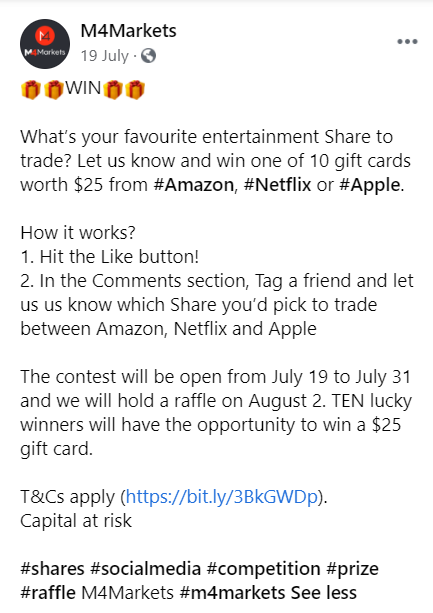
See Your Competition Through to the End
If you host a competition, don’t just choose a winner and ignore all other entrants. This isn’t good practice, and it won’t help to create a strong social media community. Instead thank everyone for taking part, share any necessary contest results (especially if you incorporated a questionnaire or poll into your campaign) and give a shout out to the winners. Tagging followers will also generate brand awareness and could help build your following.
This is how M4 Markets wrapped up their contest. Note how the information is presented clearly in a bar graph. M4 Markets also used the competition to generate additional content which directs followers onto a page with an ‘Open Account’ button. This is a great way to push people further along the marketing funnel.
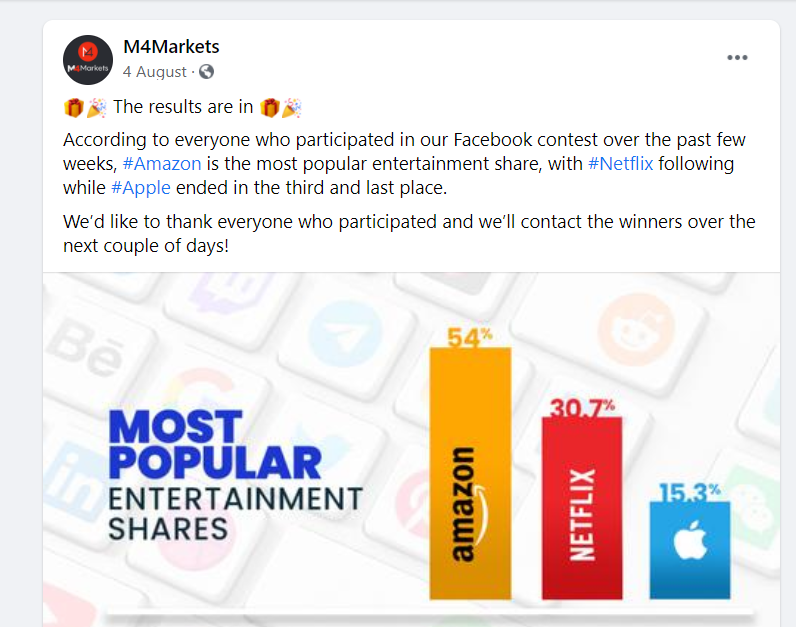
Think About Easy Rewards and Prizes
Your role as a marketer doesn’t start and end with a social media competition. You’re busy, so keep things simple. Rewards should be easy to give out. Many brands choose to send vouchers via email or to issue gift cards in the same way. Both of these techniques are quick and easy to implement. But again, make sure you include all relevant GDPR disclosures so that people know that you use their personal information (such as email address or telephone number) in certain ways when they participate in your contest. You should also clearly stipulate prizes or cash equivalents in the rules. Eg- a 100 USD voucher will be given as what in Europe? Be sure to tick all those boxes with your legal team.
Have a Set Goal/Mission
When it comes to running a contest, it’s important to have a set goal or mission. This makes your campaign easier to track and will allow you to see tangible results when it comes to an end. The goal might be something simple such as to increase Facebook likes or to spread brand awareness. You might even want to go one step further with an initiative that will benefit your industry as a whole and set you apart as thought leaders. This is a great PR opportunity and the ideal chance to collaborate with like-minded people.
This is exactly what the NatWest Group did when they launched the Global Open Finance Challenge. Designed to build a stronger, more progressive global banking and financial industry, the challenge had a very clear purpose. By bringing together financial services firms and global innovators, collaborators hoped to create great outcomes for people, families and businesses. And the winners would see their financial initiatives trialled with leading financial organisations as explained here in detail.
When coming up with such a campaign, be sure to highlight the benefits of the contest in your social post and link to more detailed content. Include an entry deadline and clear entry instructions. Entice followers in with an opening question or an interesting fact.
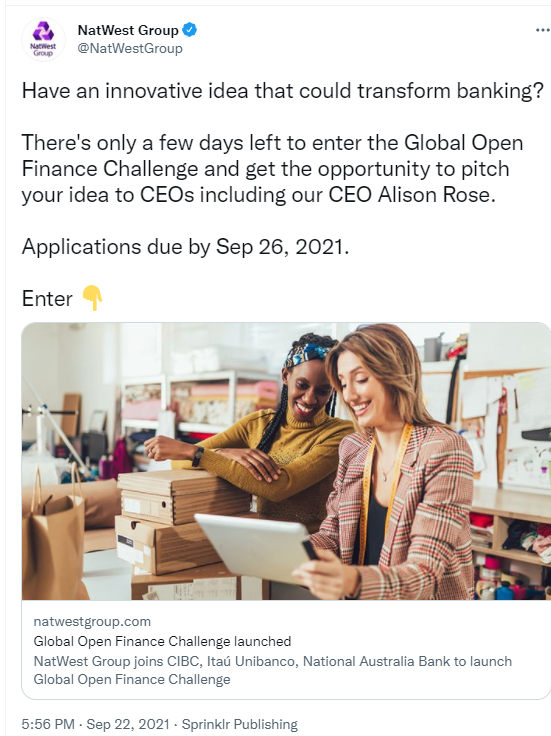
Content marketing for the finance sector is complex. Our team understands the compliance landscape for key regions and we have extensive experience of running contests and promotions. Speak to the Contentworks team today.
Enjoyed reading Running Contests in the Finance Space – Best Practices? Go ahead and hit share.
